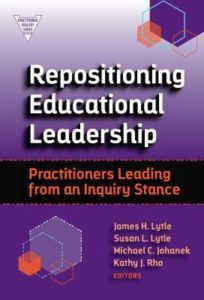 Repositioning Educational Leadership
Repositioning Educational Leadership
by James Lytle et al
4/5
The idea of using inquiry to drive change is both inspired common sense and not entirely obvious. That’s why when I heard about Repositioning Educational Leadership: Practitioners Leading from an Inquiry Stance (Teachers College Press 2018), I was thrilled to read it. Teachers are familiar with the inquiry classroom but it doesn’t always filter up to administrators.
“…educational leadership for k12 schools is increasingly complicated, as demands on educational leaders and schools continue to escalate.”
“Leaders need opportunities to learn from the ‘inside’ of other leaders’ experiences, doubts, and all. This volume addresses that need.”
The authors, James Lytle, Susan Lytle, and Michael Johanek, collected evidence from school leadership who used inquiry to solve recalcitrant problems in their schools. The result is this book with a simple rationale: Education leaders must position themselves as inquirers. They must lead from an inquiry stance.
The book is organized into three sections: Learning from and with Students, Collaborating with Teachers and the School Community, and Leading System-level Inquiry. Each chapter within the theme is written by a school leader and shares their story of how leading with inquiry solved a problem they faced. These range from struggling to serve diverse groups of students to addressing where the usual education practices were failing. I found all of them interesting and instructive, each resonating with some aspect of my own experience. In all of these, solutions included the application of inquiry–talking to students, to faculty, to groups, to parents. And listening.
“As a new CFO transitioning into a K-12 urban school district, I saw myself as a positive deviant who through inquiry could general new thinking among other administrators.”
I didn’t feel the goal was to pedantically teach me the right path, rather to share how each individual solved a particular situation, their solutions heavily dependent upon their own specific set of circumstances. What I got from their retelling was an understanding of how they evaluated situations, a model I could take with me to solve my own.
“Though none of the chapters is a traditional report of research, we believe that these varied narratives about inquiry-driven leadership could be considered something of a new genre with the potential to make a significant contribution to the professional literature…”
But be forewarned: This book is not for the faint of heart. The introductory sections on Rationale, Inquiry as Stance, Genesis of the book, and Practitioner Inquiry are not a casual read. They are thick with leadership jargon the editors felt necessary to relay the topic. For me, it required considerable concentration. Phrases like:
“Who does the sense making…” (page 3)
…and neologisms like:
“Problematize” and “problem posing” (page 3)
“…their own dis-ease…” (page 2)
“Inquiry as stance is perspectival…”(page 4)
… made the content difficult to access. I had to decode the words, unravel the context, and then re-read, this despite my Masters, post-grad classes, and thirty years of teaching from Kindergarten through grad school. It may be that the preferred audience is not the passionate future administrator who might casually pick up this book but the highly-schooled current one with a PhD in his/her field. I have to admit, I was glad this pedantic voice ended with the introduction and the personal experience stories were much more down-to-earth and clear.
The introduction notwithstanding, by the time I finished the book, I had a broad and robust construction of inquiry well beyond what I had when I started. Fixing the systemic problems in education is at the top of every administrators ToDo list. This book provides real solutions that have worked. I highly recommend it for all education leaders in search of fresh options for age-old problems.
–ARC received free but the opinions are my own
Jacqui Murray has been teaching K-18 technology for 30 years. She is the editor/author of over a hundred tech ed resources including a K-12 technology curriculum, K-8 keyboard curriculum, K-8 Digital Citizenship curriculum. She is an adjunct professor in tech ed, Master Teacher, webmaster for four blogs, an Amazon Vine Voice, CSTA presentation reviewer, freelance journalist on tech ed topics, contributor to NEA Today, and author of the tech thrillers, To Hunt a Sub and Twenty-four Days. You can find her resources at Structured Learning.



































